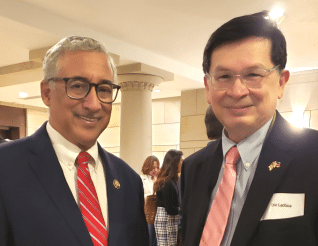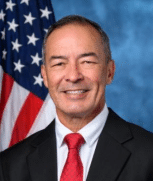Medicare Portability Act promises lifeline for Fil-Am retirees in PH

US Medicare PH leaders visit Guam US Delegate James Moylan in his Capitol Hill office in May 2024. From left: organizer Eric Lachica, Board Chair Apollo Inserto, Del. James Moylan and Director Capt. Jun Tucay. CONTRIBUTED
LOS ANGELES – In a move that could revolutionize healthcare for Filipino American and other US retirees living overseas, Guam Delegate James Moylan has reintroduced the Medicare Portability Act in Congress.
The proposed legislation seeks to allow American seniors living abroad – particularly in popular destinations like the Philippines – to access their Medicare benefits without having to return to the US.

Philippine Nurses Association of Metro Washington leaders pose with ‘Bring Medicare Home!’ banner with Eric Lachica, organizer of USMedicarePH.org, at their booth during the Fil-Am Festival in Fairfax, Virginia, on May 31, 2025. CONTRIBUTED
The long-awaited bill is set to impact over 700,000 American retirees living abroad, including more than 35,000 in the Philippines. Many of these retirees are Filipino Americans who spent decades serving the US as nurses, teachers, engineers and healthcare professionals.

Rep. Bobby Scott with Eric Lachica | Photo from USMedicarePH.org
Currently, Medicare coverage ends at the US border, leaving American retirees living abroad without access to the healthcare benefits they earned after years of contributions.
The Medicare Portability Act, now included as a budget rider in the FY 2026 Labor-HHS-Education Appropriations Bill, seeks to address this gap.
If passed, the legislation would introduce a pilot program allowing Medicare benefits to be used in 12 partner countries, including Canada, Germany, Mexico, South Korea, Israel and the Philippines. These countries were selected for their US-aligned healthcare systems and sizable populations of American retirees.
Eric Lachica, a longtime advocate and organizer of US Medicare Philippines, Inc. – a group composed of Filipino American medical professionals, retirees and community advocates – has been leading lobbying efforts since 2011.
“I’ve been very passionate about this because many of our elderly Filipino American nurses and doctors want to retire (abroad),” said Lachica in a previous interview.
Hundreds of thousands of Filipino doctors, nurses, medical professionals, teachers and workers emigrated to the United States between the 1960s and 1990s in response to invitations from US medical and educational institutions, as well as businesses, to meet the needs of the American population.
Lachica and other supporters of the bill argue that, after decades of hard work, they have contributed to Medicare and deserve the portability of benefits at internationally accredited hospitals and healthcare providers in their country of birth.

Members of US Medicare Philippines are campaigning for passage of the Medicare Portability bill. Photo from USMedicarePH.org
According to US Medicare Philippines, 100 Filipino American seniors retire every day, contributing to the larger trend of 10,000 baby boomers turning 65 in the US daily. Many choose to spend their retirement in the Philippines, where they can be close to family and enjoy a significantly lower cost of living.
However, under current laws, while Social Security payments can be received abroad, Medicare cannot be used for long-term care outside the United States.

US Delegate James Moylan | Photo from USMedicarePH.org
For many Filipino Americans, this gap is a costly barrier. They must either return to the US for care or pay out-of-pocket in the Philippines, despite continuing to pay $174 per month in Medicare Part B premiums – funds deducted from their Social Security benefits.
Supporters of the bill, including US Medicare Philippines, argue that expanding Medicare to accredited international providers would be both a smart financial move and a moral imperative.
The organization estimates that Medicare portability could reduce costs by at least 50 percent per retiree. The average US Medicare cost per beneficiary is $14,000 per year.
Treatment in countries like the Philippines – where healthcare is dramatically less expensive – could reduce that cost to $7,000 or less. Specifically, in the Philippines, the US government could save an estimated $2.8 billion annually if 400,000 retirees decided to live there and were covered by local healthcare providers.
This isn’t without precedent. US military retirees living in the Philippines already receive care through TRICARE and VA programs, and some Medicare Advantage (Part C) providers offer six-month global coverage for retirees traveling abroad.
In Guam, some Medicare beneficiaries are allowed treatment in Philippine hospitals that meet Joint Commission International (JCI) standards.
Hospitals like Makati Medical Center, The Medical City, St. Luke’s Medical Center, Chong Hua Hospital and The Medical City Clark already meet these high JCI standards. They use electronic health records (EHRs) and offer transparent, regulated pricing, making fraud prevention manageable under the existing oversight protocols of the Centers for Medicare and Medicaid Services (CMS).
While the bill has reentered the legislative process with growing bipartisan support – bolstered by the Philippines-US Friendship Caucus – it must still pass through the House Appropriations Committee and Congress.
However, momentum is building. Lachica believes the reintroduction of the Medicare Portability Act is a win-win for both American retirees and taxpayers.
“We are hopeful for the bill’s passage,” Lachica said. “The chances of success are excellent, and we anticipate widespread support from over one million American seniors living abroad, including the nine million US voters in the 12 proposed countries.”
Moylan agrees. “Our retirees get care, the government saves billions, and the US strengthens bonds with allied nations.”
For Filipino American seniors who have given a lifetime of service to the United States, the reintroduced Medicare Portability Act offers the promise of dignified, accessible, and affordable healthcare in retirement – without having to leave their homeland or abandon their Medicare contributions.
Advocates are urging Filipino American and other US retirees, as well as their supporters, to actively participate in the campaign by contacting their congressional representatives. According to Lachica, the support of everyday Americans is crucial.
“We need people to reach out to their members of Congress, and we’ve made it easy for them to do so. Visit our website or follow us on Facebook to stay updated and show your support,” he encouraged.

